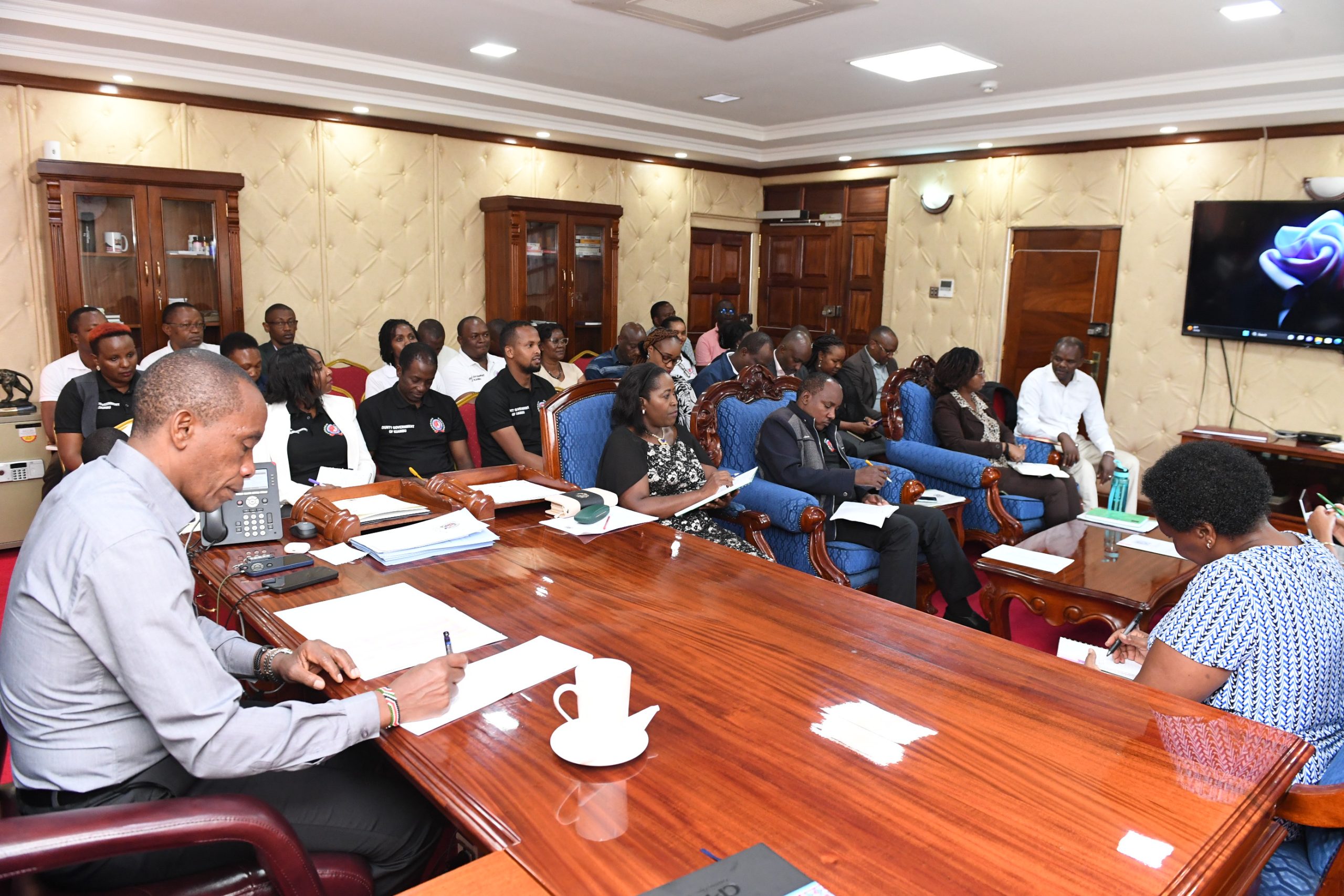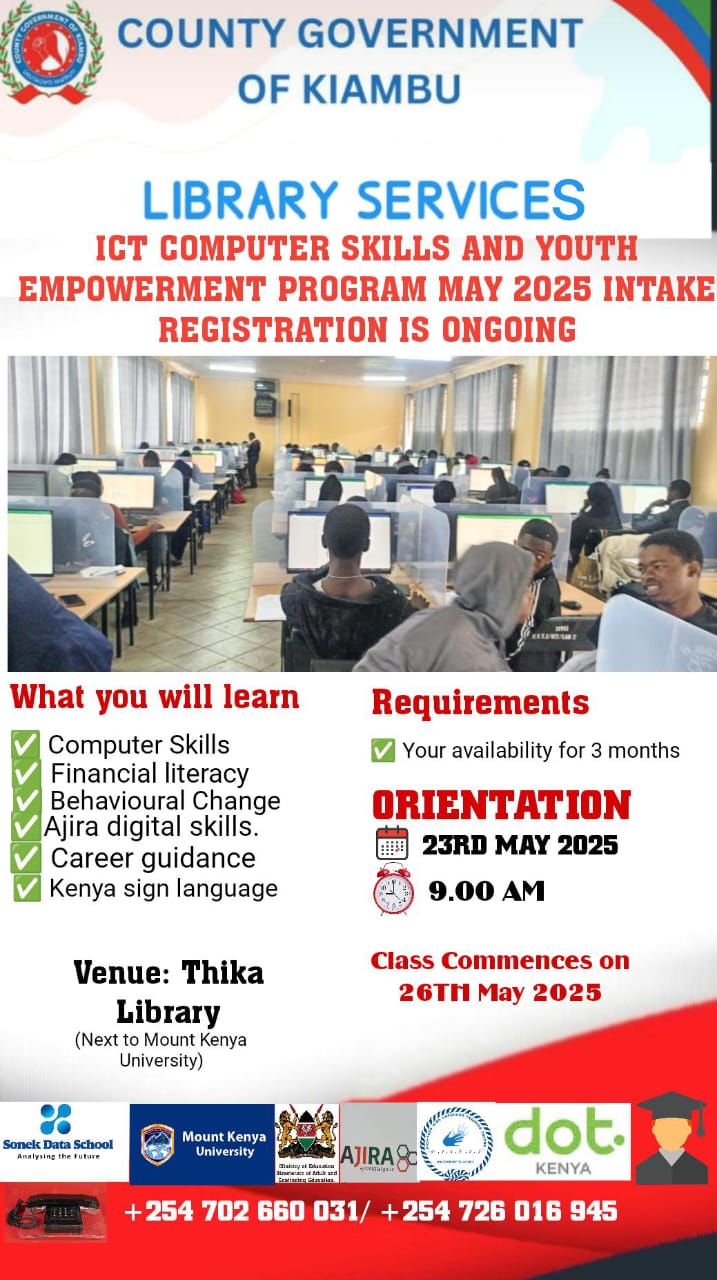Wamatangi’s early morning strategy that brought positive change in Kiambu
 Governor Kimani Wamatangi presiding over a management meeting at his office. The meetings happen everyday from 6:30 am. Photo: Ayub Muiyuro
Governor Kimani Wamatangi presiding over a management meeting at his office. The meetings happen everyday from 6:30 am. Photo: Ayub Muiyuro
‘The Kiambu Report’ writer
Every day, at the crack of dawn, Governor Kimani Wamatangi is already seated in his office,
prepared to address the needs of his people. Since taking office, the Governor has not only made it a habit but a rule to be at his desk by 5 am.
This new approach has been embraced by the county government’s management, instilling a culture
of early office attendance to strategise for the day ahead. This shift in mindset has led to the
implementation of daily management meetings among top county officials. These sessions focus on
thoughtful discussions and planning to devise effective strategies for “Making Kiambu Great Again.”
In contrast to other government offices where officials typically arrive after 8 am merely to hang their coats before leaving, the Kiambu County Government maintains a strict routine.
Here, all top county officials are required to participate in a daily management meeting within the Governor’s office, spanning from 6:30 am to 9 am. This session serves the purpose of planning and discussing the government’s agenda, aligning it with the governor’s manifesto and addressing the people’s priorities.
Governor Wamatangi presides over the meeting, while the County Secretary’s office records the
minutes. Additionally, the governor personally takes notes for follow-up and action.
The meeting involves each department presenting their respective work plans, action points and
timelines. Progress on previously presented projects and programs is reported, with CECMs or chief officers delivering PowerPoint presentations on a large screen mounted on the wall.
Governor Wamatangi actively contributes to the meeting, offering input that includes adjustments,
corrections, and guidance to ensure precision in the execution of plans.
Unlike many other organisations where heads of institutions tend to adopt a one-man-show
approach, Governor Wamatangi emphasises a style that fosters collective responsibility in running
the county.
According to him, this approach not only enhances transparency and accountability but also ensures that all departmental heads openly share their plans. Moreover, it contributes to increased effectiveness and efficiency.
“The meetings help us understand our position in terms of project plans and execution in each
department. They prevent us from working in silos. Everyone comprehends the activities of each
department and when a program spans multiple departments, they collaborate in its implementation, avoiding a one-man-show approach,” notes Mr. Wamatangi.
The planning department is mandated to have the budget ready and the governor has issued a
directive that all call tenders must be paid within 14 days or a maximum of 30 days upon delivery
and completion.
Individuals who have previously worked with Wamatangi, whether in his private businesses or
during his Senate tenure, attest that early morning planning meetings are his modus operandi.
They describe him as a hands-on leader who values tidiness and dedication in all his endeavours.
Wamatangi expects the management team to emulate his approach and instil the culture he has
introduced in their subordinates.
In a marked departure from the previous regime, where offices were dilapidated with an unkempt
compound, the county offices today undergo regular renovation and are freshly painted. The
premises feature a lush green lawn that receives daily watering, reflecting a commitment to
maintaining a conducive and aesthetically pleasing work environment.
Mr. James Njuguna, the Chief of Staff, emphasises the importance of the meetings in monitoring the implementation of county projects. In certain instances, departments are required to provide daily updates on specific projects. \According to Njuguna, the primary objective of these meetings is to foster a sense of collective responsibility among the leadership regarding the county’s management.
He explains: “The meetings provide a platform for leadership to engage in discussions. Members
collaborate to enhance proposals, departments offer mutual support, and the governor assumes the
role of monitoring, evaluating, and guiding progress based on the action points.
The action points are aligned with the timelines set by each department.”
This approach ensures that every CECM and chief officer is familiar with the programs of other
departments. They are directed to support one another, preventing any department from falling
behind and ensuring effective service delivery.
Osman Korar, the CEC for Youth, Sports and Communication, highlights the benefit of discussing
programs in other departments during these meetings. He notes: “When making presentations, the
governor and the rest of the team provide constructive feedback to enrich ideas or introduce new
perspectives. It exemplifies teamwork as we collectively strive to enhance Kiambu.”








